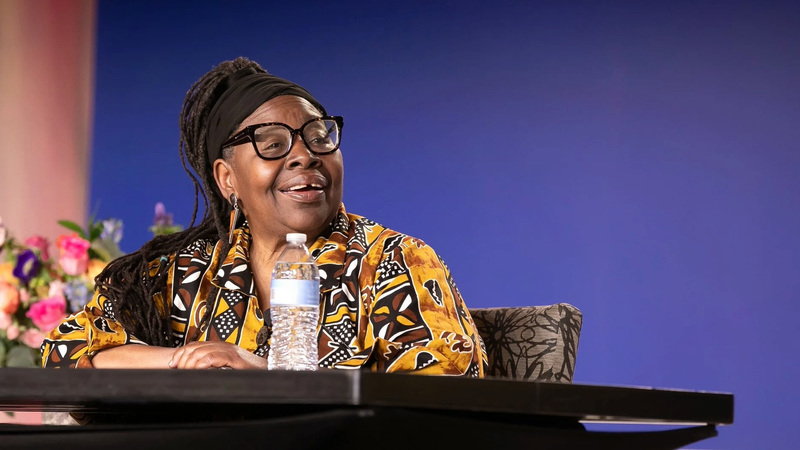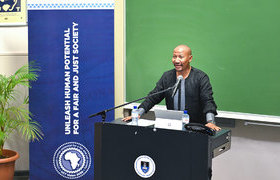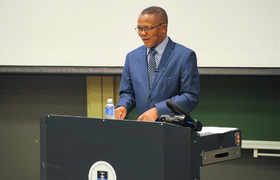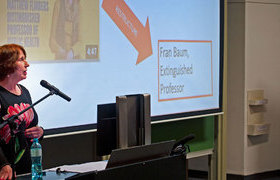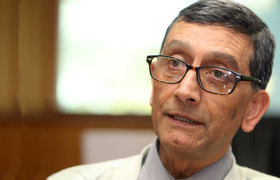‘Call in, not out’: Activist on justice with compassion
11 August 2025 | Story Myolisi Gophe. Photo Loretta J Ross media kit. Read time 8 min.Associate Professor Loretta J Ross’s lecture at the University of Cape Town (UCT) this week was critical and opportune for various reasons. In a world where outrage travels faster than reflection, she offered something profoundly countercultural: an invitation to call in, not out.
According to Associate Professor Ross, “calling in” encourages dialogue, empathy and mutual accountability and demonstrates how compassionate communication can build stronger, more inclusive communities.
An associate professor at Smith College in the United States (US), Ross delivered the 59th TB Davie Memorial Lecture on 6 August, titled “Calling In: Navigating Challenging Conversations and Cultivating Compassionate Connections”. The lecture was streamed online (with in-person screening).
Organised by the Academic Freedom Committee and chaired by Professor Rudzani Muloiwa, the lecture was established by UCT students to honour Professor Thomas Benjamin Davie, a committed defender of academic freedom who served as vice-chancellor at UCT from 1948 to 1955.
With over five decades of experience in advocacy and education, Ross is a highly respected public intellectual and activist whose work has influenced key movements, including the early anti-violence movement and the ongoing fight for reproductive justice.
From reproductive justice to radical empathy
While best known for her work on reproductive justice, she noted that her latest passion is “helping us build a new human-rights-based movement that centres love”.
“Yes, I helped found the concept of reproductive justice, but now I want us to start thinking about accountability with love and grace rather than anger, violence, and shame.”
Justice, she argued, must be “a vision where everybody benefits, and everybody is allowed room to grow”.
That requires a serious reckoning with power. “There’s a tendency to deal with power inappropriately by just flipping the roles, putting those who had none in charge, but without changing the structure. You’ll likely replicate the same practices of abuse if you get power. We should seek to share power. And yes, that means some people have to give up their right to oppress others. But they don’t lose anything by doing that. A lit candle loses nothing by lighting another, the Buddhists say.”
As she unpacked one of today’s most divisive cultural practices, call-out culture, Ross didn’t mince her words. “We think people need to be held accountable – and they do. But we’ve chosen anger, blaming, and humiliation as the means of doing it. And that doesn’t work the way we think it does.”
She explained that while calling out is an accountability process, it’s often counterproductive. “Once you publicly shame someone, you’ve invited them into a fight instead of a conversation. And once they’re in that fight, they’re not going to keep talking with you. That’s just human nature.”
The problem, she stressed, is that “calling out thwarts its own goal”.
“Exiling people, discarding them like used tissue, refusing to listen to them again – this is not liberation. This is punishment.”
As a long-time human rights activist, she knows calling out has a history in justice movements. “I understand why people are devoted to calling out because it’s been our favourite tool. But even as a tactic, it should be the last resort, not the first one out of the toolbox.”
That last resort, she explained, is cancelling.
“Cancelling is the ultimate call-out,” she said. “It’s when you decide that what someone did is so egregious that they deserve to lose everything – their job, their platform, their reputation. But here’s the contradiction: when we cancel people, we’re replicating the very logic of the prison industrial complex we claim to oppose. Exiling people, discarding them like used tissue, refusing to listen to them again – this is not liberation. This is punishment.”
Ross argued that cancelling should be reserved only for those who’ve been offered the chance to do better and repeatedly refused. “That could be corporations, governments, or individuals who double down instead of learning. Then maybe – maybe – cancelling is warranted. But it’s not the opposite of accountability. It’s just a very final version of it.”
Compassionate alternatives
So, what’s the alternative?
“Calling in is about choosing conversation over confrontation. It’s about building a container big enough to hold all the experiential diversity in the room and still move forward towards justice. It’s saying: I see you. I don’t agree with you, but I believe you’re capable of growth, and I’m inviting you into that process.”
But what about when we don’t have the time or energy to engage?
“That’s where calling on comes in,” she explained. “That’s when you want someone to do better, but you’re not going to do the emotional labour of helping them get there.”
A good example of calling on is pointing out the disconnect between an organisation’s external diversity statements and its internal practices. “You want them to reconcile that gap, but you’re not going to walk them through it step by step.”
And when even that feels like too much, “we call it off.”
“That’s the first disengagement strategy,” Ross said. “It’s when you realise: I don’t have time for this. I’m not going to engage with trolls, or bad-faith actors, or people who are more interested in winning an argument than having an honest dialogue.”
“We already know how to pause. We just need to universalise that in moments of conflict.”
She emphasised that learning to disengage is not a weakness; it’s boundary setting. “You have to check your internal temperature. Are you hungry? Sleep-deprived? Angry? Then maybe now is not the time for a difficult conversation. That’s OK. Take a breath. Pause. Ask yourself: What kind of engagement am I up for right now?”
She likened it to parenting. “If you’ve ever had a difficult child, you already know you don’t say the first thing that comes to your mind. Otherwise, that child’s going to be in therapy for life, or you’ll be fired if it’s your boss,” she said. “We already know how to pause. We just need to universalise that in moments of conflict.”
What underpins attention-seeking and punitive cancelling, according to Ross, is something deeper: the legacy of white supremacy, patriarchy, and capitalism.
“It’s no accident that we act like this. These systems have trained us to deal with mistakes through punishment and exile. But if we want to dismantle those systems, we can’t use their tools.”
She paused to clarify a term often misunderstood. “White supremacy, as I use it, is not just about white people. Whiteness is just an identity. White supremacy is an ideology, a belief system built on hierarchy, domination, and control.
“And not all white people are white supremacists. But sadly, not all white supremacists are white.”
Hope in the face of hostility
She warned that universities in the US are under “full-throated assault” from forces seeking to ban all conversations around race, gender, struggle, oppression. “They don’t want us to teach an honest version of history because they’ve learned how powerful it is to repeat it. They want to preserve the immunity they’ve enjoyed for far too long.”
But she refused to give in to despair.
“This is not the time to give up. Human rights, like those embedded in the South African Constitution, are the best antidote to fascism humanity has ever created. We have truth. We have evidence. As young people say: we’ve got the receipts. The paper trails. The history books. And most importantly, we’ve got time on our side.”
Even though the timeline of justice can feel painfully slow, she urged the audience to remain steadfast: “All we can do is maintain our determination, our hope, our commitment to justice. And eventually we win.”
 This work is licensed under a Creative Commons Attribution-NoDerivatives 4.0 International License.
This work is licensed under a Creative Commons Attribution-NoDerivatives 4.0 International License.
Please view the republishing articles page for more information.


